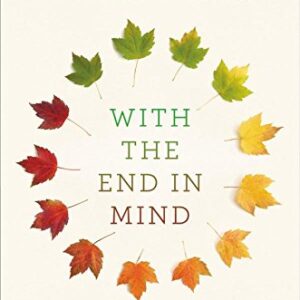Death’s Gift
Here in San Miguel we are approaching Semana Santa, Holy Week. We are told that the festivals and processions of Holy Week in San Miguel may, in their drama and extravagance, be second only to Barcelona, Spain.
In my sermon for the fifth Sunday of Lent (which will show up here next Monday), I speak of the meaning of Christ’s crucifixion and resurrection, the unavoidable center of the gospel story and Christian faith. That these events are central does not mean their meanings are either easily understood or uncontested. Quite the contrary. For more on that, stay tuned.
 But here I want to draw on a book I’ve mentioned previously, one in the current series of my book group on “Aging and Mortality.” That book is With the End in Mind by the British palliative care physician, Kathryn Mannix. In a world where death is increasingly medicalized, we’ve lost some of the wisdom our ancestors carried. Mannix is trying to help us recover such wisdom, and by doing so to reduce our fear of death.
But here I want to draw on a book I’ve mentioned previously, one in the current series of my book group on “Aging and Mortality.” That book is With the End in Mind by the British palliative care physician, Kathryn Mannix. In a world where death is increasingly medicalized, we’ve lost some of the wisdom our ancestors carried. Mannix is trying to help us recover such wisdom, and by doing so to reduce our fear of death.
One of the things she writes about, borne of her decades of practice in palliative care, is a paradox. Namely, instead of becoming more fearful or anxious, the dying become more gracious, more compassionate and even nobler versions of themselves. For those in palliative care, death — instead of terrifying the dying — seems to free and to humanize them. Mannix writes of this paradox:
“Let’s pause to look at a paradox that occurs daily in palliative care. Often, when we turn up on a ward, or take a referral for community palliative care team support, the staff ask, ‘Why do you always come to see our most lovable patients? How do you get all the nicest people in your care?’ And it feels like a truth: when we look around the hospice in-patient ward, and the day care attendees, or our case list for the hospital or community palliative care teams, we realise that these are all remarkable people. Are we just looking at the world through rose-tinted glasses? Or is there genuinely something special about people who realise that the end of their life is approaching?
“I have spent a lifetime pondering this idea. And gradually, I have begun to see a pattern. It is, in fact, a truth that almost all of the people we have the privilege of meeting towards the end of their lives are extraordinary. They tolerate their symptoms with courage. They adjust their hope from avoiding death to embracing each day as death approaches. They can let go of the tyranny of planning and worrying about the future, and simply bask in the present. This was so eloquently expressed by the dying playwright Dennis Potter in his final broadcast interview, when he described his new-found discovery of the ordinary, appreciating the blossom on the plum tree outside his window as ‘the whitest, frothiest, blossomest blossom that there ever could be, and I can see it’.
“These people change the centre of their world from self to others. They focus on loving their loved ones, but that kindness also beams onto everyone else around them–their fellow patients in hospital or hospice, and all of us who care for them.”
When, instead of palliative care, people are receiving so-called “heroic” medical interventions intended to prolong life whatever the cost in suffering or expense, they may not have the chance to experience, and extend to their own families and loved ones, the transformation Mannix reports to be, if not uniform, then at least common among the dying.
And that’s a real loss for all of us. When the sick and dying are isolated in vast institutions that easily become forbidding, and when the most extensive and life-prolonging medical interventions are applied, the work of dying — putting one’s house in order, coming to terms with one’s life, making amends as needed, conveying love — may not be able to happen. We are, you might say, so determined to keep the body alive that the soul doesn’t get to do its work. And those who remain are deprived of witnessing and benefiting from that soul work — work that lessens the natural human fear of death among the living.
I remember my sister’s death, ten years ago now. While a hard loss, her dying was also a testament to her own life and to the gift of life itself. With cancer having spread throughout her body, she chose to forego extensive treatment and intervention. She came home where her son and I cared for her, and where friends and family could easily be with her. In her I saw what Mannix describes. It was a gift to the rest of us. In the midst of her death, a gift was given.
![Anthony B. Robinson [logo]](https://www.anthonybrobinson.com/wp-content/themes/anthonybrobinson/images/logo.png)
![Anthony B. Robinson [logo]](https://www.anthonybrobinson.com/wp-content/themes/anthonybrobinson/images/logo-print.png)